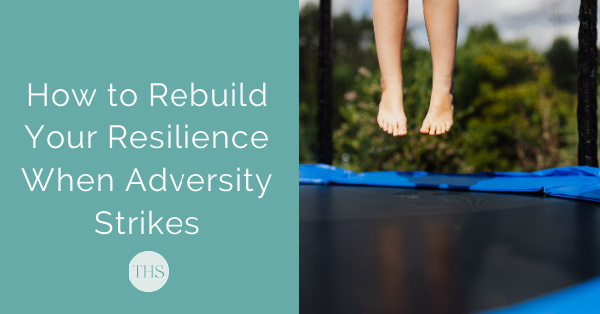Your Guide to Finding New Meaning When Chronic Illness Turns Life Upside Down

This article contains some affiliate links to resources you may find helpful, at no extra costs to you. All opinions are my own.
It’s one of the hardest things you’ll have to learn: getting back on your feet again when life knocks you down.
Experiencing debilitating symptoms, losing a loved one or big life changes like a divorce or unemployment can take you on an emotional rollercoaster and leave you feeling overwhelmed, worn out, helpless and defeated. You may not know what to do to ‘fix’ things, or you can’t summon the strength to take action.
Resilience refers to the ability to bounce back from adversity. When stressful situations occur, you still feel sad, angry or anxious, but you manage to adapt to the difficult circumstances and are able to cope when things get challenging.
Of course, we’d all would love to stay strong in the face of adversity, but how exactly do you cultivate resilience when you’re going through tough times? What can you do to build self confidence and adopt the right mindset to overcome challenges when you’re already in pain, low on energy and struggle to focus?
And most importantly, how do you get your resilience back if you feel lost and overwhelmed right now? The Japanese saying may go “Fall down seven times, stand up eight”, but it’s hard to keep fighting your way back after every health setback when you’ve been sick for so long.
Sadly, you can’t develop mental strength over night, but here are some science-backed strategies to rebuild your resilience when adversity strikes.

As much as we wish it weren’t so, there is no way to escape bad things in life from happening. But science shows that the way we perceive potentially stressful events has a big impact on how our body and mind react to what’s happening.
You probably don’t realize it, but all day long, you unconsciously and immediately assess how certain situations will affect your life. You try to figure out whether that sleepless night, the pain in your back or that argument with your friend could hurt your health, damage your relationship or ruin your plans.
As it turns out, this intuitive process of cognitive appraisal influences how you will then cope with the situation. When you see an incident as a threat to your wellbeing or you feel you can’t handle the situation, your body will respond accordingly: your heart rate will go up and your adrenal glands release cortisol to get ready for action. And that’s a critical survival skill when you have to jump out of the way of a speeding car, but this stress response can hurt your health if you constantly interpret smaller, more ambiguous triggers as a threat.
So one way to rebuild your resilience is by reframing potentially stressful events as a challenge you are able to overcome. This mindset shift reminds you of your capabilities and encourages you to take the necessary steps to deal with the situation. In some cases, difficult situations could even be seen as an opportunity to learn and grow. Of course you shouldn’t put a positive spin on truly painful experiences, but reappraising a temporary flare-up or lonely weekend can lessen the negative effect of stress on your health, and help you to cope better. Speaking of coping…
When it comes to coping with adversity, it can be helpful to look back on how you’ve handled crises in the past. What can you take away from those difficult times and apply to your current situation? Which strategies worked well for you, and what wasn’t helpful? Who did you turn to, what helped you to release stress, how did you stay positive?
Studies suggest that taking the time to reflect on your experiences and learn from them helps to strengthen your resilience and adapt better to life with chronic illness. If you don’t know where to start, learn more about these 11 emotion-focused coping strategies to deal with life stress.
Deep down, wee all have a picture in our mind about how life’s supposed to go. Becoming seriously sick often throws those plans and beliefs out of the window – sometimes for good. You may be wondering why this is happening to you, and struggle with the notion that life isn’t fair.
Part of rebuilding resilience is developing the ability to deal with uncertainty and adapt to change. And that’s hard, because our brains see ambiguity as a potential threat. But no one knows what the future will look like until it’s there. What helps to embrace uncertainty, is to practice mindfulness and bring your awareness to the present moment. Learn to accept your current situation as it is, while treating yourself with compassion. Focus on the things you can control – overthinking won’t fix the problems that are out of your hands.

When adversity strikes, we go through all kinds of emotions – from shock and disbelief to anger, sadness and helplessness. And that can be scary and painful. Deep down, you may want to run away from those feelings, pretend that your pain will go away if you just ignore it.
But suppressing your emotions is like trying to hold a beach ball under water – it’ll cost you a surprising amount of energy only to pop up when you least expect it. So when you’re going through tough times, make room for all your feelings. It’s ok to be frustrated, anxious or even desperate; you don’t have to push hard feelings away or drown your sorrows. If you can, just sit with your emotions and observe them as if your feelings are clouds in the sky, just passing by. Because as hard as it seems now, you won’t feel like this forever.
You can focus on your breathing to help you process the pain you’re feeling. Sometimes it helps to sense where in your body you’re holding tension – are you clasping your jaw in anger, do you have a pit in your stomach of anxiety or a lump in your throat of sadness? You could even visualize your emotions – a black hole in your heart, dark red fists of frustration – and then vividly picture how they slowly melt away. If you have a hard time identifying your feelings, check out Brené Brown’s beautiful ‘Atlas of the Heart’.
As you’re rebuilding your resilience, give yourself enough quiet moments by yourself to handle difficult emotions well.
In a similar spirit, find healthy, constructive ways to deal with the stress you’re experiencing. We all know that numbing our pain with wine, pills and cigarettes will only hurt us more in the long run. But avoiding bad habits when you’re stressed out is easy said than done. So don’t be afraid to reach out for help when you find yourself turning to addictive substances too often.
Handling stress by eating ice cream each night, impulse shopping online, lying awake at night overanalyzing the situation and isolating yourself from family and friends may seem more innocent than addictive behaviors, but they also aren’t the most effective coping strategies.
Instead, you could try talking to a trusted friend, clearing your mind with a walk, taking a warm bath to relax your body, expressing your emotions through journaling, music or creative activities, or finding some meaning in the adversity.

Connecting with the people in your life is one of the best ways to rebuild your resilience during hardship. Depending on the situation, your family and friends could offer a listening ear, give good advice or look at your problems from a new perspective. Getting a helping hand from your community also makes it easier to tackle your problems. And of course, feeling that you are not alone gives you the strength you need to bounce back from adversity.
But sadly, all too often, people with chronic illness struggle with social isolation and emotional loneliness. It’s not easy to rekindle your relationships when you’re sick at home most of the time. Here are a few low-key ideas to socially interact when you’re chronically ill:
It’s no secret that stress can wreak havoc on your body and mind. So when you’re going through tough times, take good care of yourself.
As difficult as it is, try to get enough sleep. Give yourself a bedtime, then start winding down one hour beforehand with a relaxing routine. Having a bedtime ritual signals to your brain it’s time to prepare for sleep, and can help to prevent lying awake at night worrying. Still struggle to catch some z’s? Take a look at these tips for dealing with painsomnia and 13 helpful things you can do when you can’t sleep at night.
You also want to stay hydrated and nourished, so experiment with low-energy ways you can still have nutrient-rich meals when you’re exhausted and overwhelmed. Think: sheet pan dinners, slow cooker meals or parchment packages.
If you’re able, move your body gently. Try to catch some natural daylight, preferably in the morning, even if it’s just drinking your tea by the open window.
Stressful times can also drain your emotional reserves, so make time to solitude and silence, so you can process your feelings and reflect on your experiences. Finally, fuel your motivation to keep going when life’s hard with inspiring stories, uplifting songs or comforting spiritual rituals.

When bad things happen to us, we unconsciously look for explanations. And it turns out that some cognitive explanatory styles make people more resilient and less prone to helplessness, depression and anxiety than others. For example, blaming yourself for events that are outside of your control doesn’t do you much good, just like one mistake does not make you or the project you’re working on a total flop.
At the same time, if you believe that you have little power over your life, that your success or failure depends on fate, luck or a higher power, you’ll be less likely to take the action needed to bounce back from adversity, compared to believing that your own behavior influences the outcome.
When you find yourself stuck in negative thought patterns, ask yourself these questions:
Changing the story you tell yourself takes time and effort, but it’s a great way to rebuild your resilience to handle whatever comes next.
Having confidence in your ability to deal with life’s challenges is an important aspect of being resilient. But when your body and brains don’t function like they used to, and you suddenly can’t do everyday things any more, you can lose that belief in yourself. How can you get your confidence back when you’re dealing with diminished abilities in different areas of your life?
There are no easy answers, but here are some ideas:

When you’re exhausted, in pain and your whole world has turned upside down, you can feel helpless, like you don’t have the strength to keep going. And that’s ok! Thankfully, you can rebuild your resilience, even when you’re going through adversity. It won’t be easy and the process will take time, patience and self-compassion.
But by changing the way you look at and interpret what’s happening to you, you can start to choose more constructive coping strategies. That will slowly give you back some confidence in yourself that you are able to deal with your challenges and bounce back from these tough times.
Because like the famous author of The Chronicles of Narnia once said,
“Hardships often prepare ordinary people for an extraordinary destiny.” – C.S. Lewis
What’s helped you to strengthen or rebuild your resilience during difficult times?